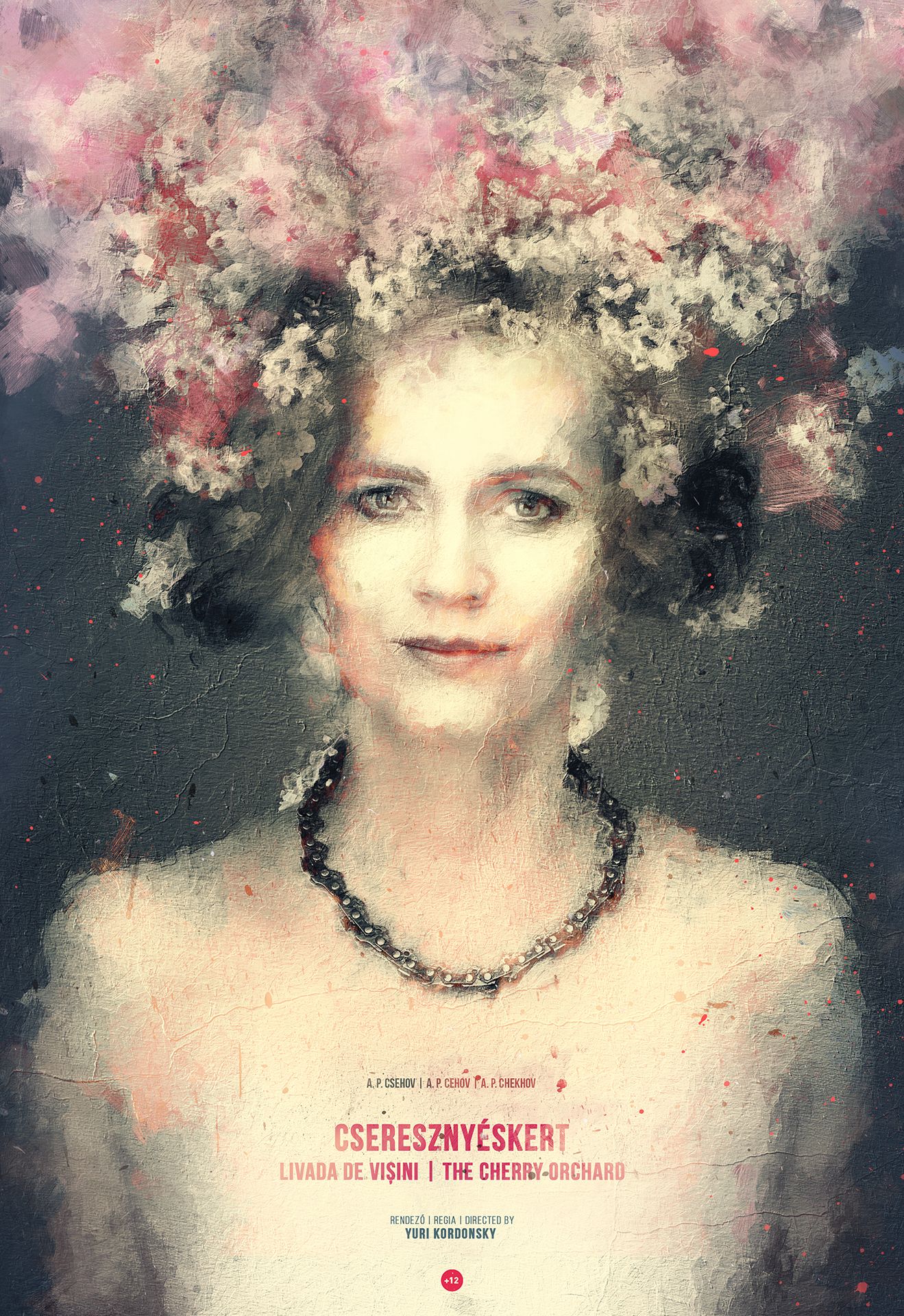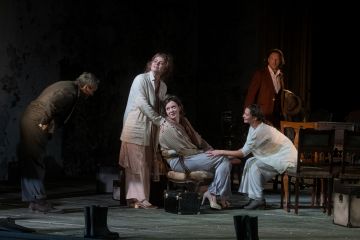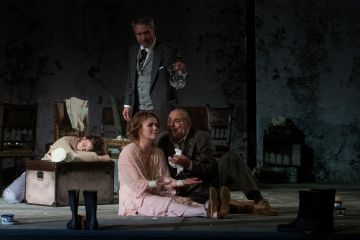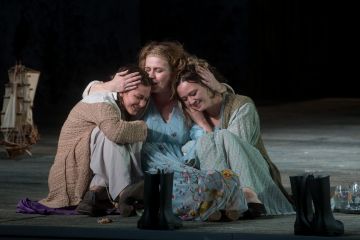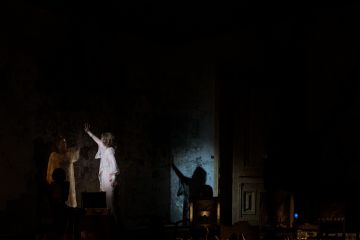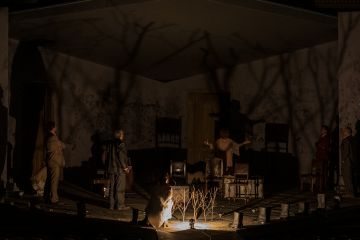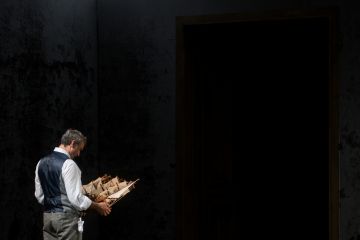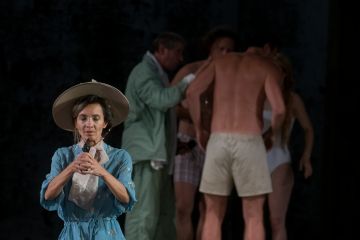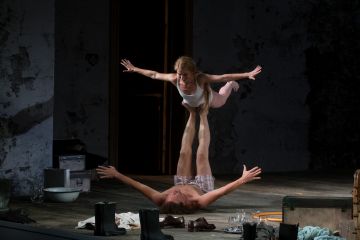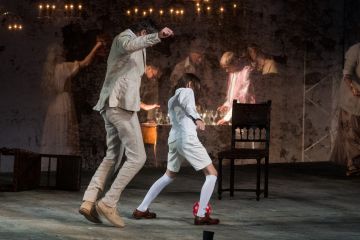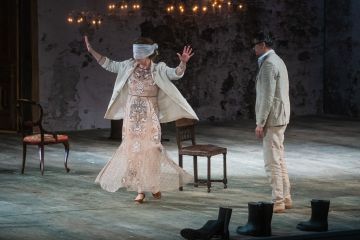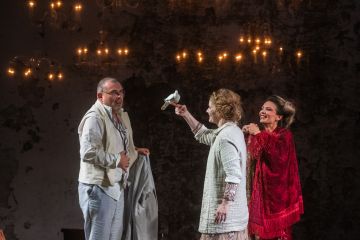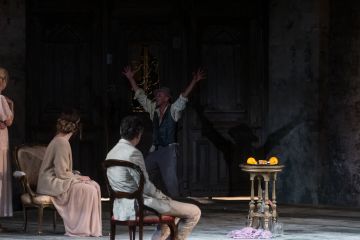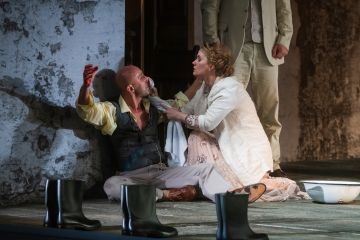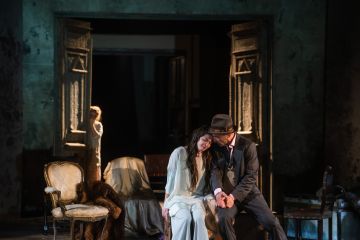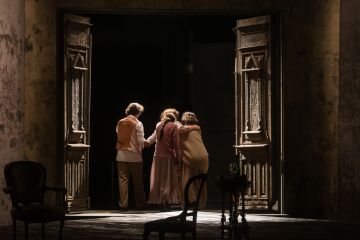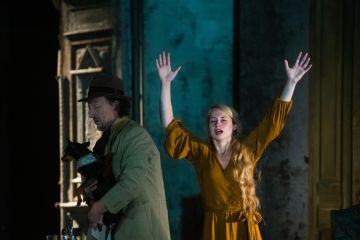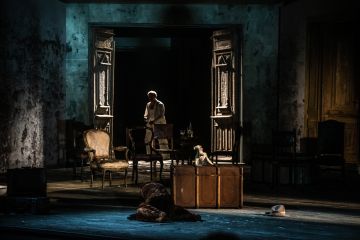Trofimov enchanted me, Simeonov and Yepikhodov made me laugh, Gayev reminded me that opportunism wasn’t born yesterday, Dunyasha reminded me again how hard it is to be yourself, to move naturally (whatever happens), Firs awoke waves of compassion in me, I almost got out of my seat to help him, while Lopakhin keeps you glued to it, challenging you to understand the madness. And Ranevskaya? She has an allure all her own, incomprehensible and impossible to judge with a clear head. You follow her everywhere in the story, since The Cherry Orchard is her story, her story first and foremost!
The Cherry Orchard is about people and dead souls. Those without memories and those denying their roots have dead, empty, barren souls. The Cherry Orchard is about the poetry of life (the poems by Rainer Maria Rilke and Imola Kézdi, inserted into the text, are no accident) and about the incredible beauty of life lived alongside others. It’s about acceptance and about “what comes after is more life”.
Nona Rapotan: Livada de vișini – „Toată Rusia e livada noastră.” [The Cherry Orchard – All Russia is our orchard], bookhub.ro, 3 September 2021
Kordonsky doesn’t want to set himself apart with all manner of crazy ideas; his productions can be considered classical; he respects author, actor and viewer alike. His shows are ‘clean’; they don’t scandalise, and neither do they feature thundering music, blinding light shows or cheap tricks. In the show, the director unearths Chekhov’s idiosyncratic humour, and though we might not laugh out loud, Kordonsky does manage to alleviate the dramatic tension somewhat. The sets, which might be construed as puritanical, fit the mood of the show and the director’s concept perfectly, and the Cluj company always offers brilliant casting choices. Our actors have excelled yet again, and each character contributes something in their own way to the success of the performance.
Nánó Csaba: The Cherry Orchard: To Abandon the Unabandonable [Cseresznyéskert: elhagyni az elhagyhatatlant] , erdelyinaplo.ro, 10 September 2021
The director studies the inner workings, the souls. The past cannot be so easily cast off, especially in a place where nothing happens, except maybe the leaves falling, or the snow, but that, too, is beautiful, because time beautifies everything. If there is no future, they grasp onto the past, when they still felt they were alive, and that life makes sense.
At times, the walls become translucent, as if there were no dividing lines between past and present, and the woman looking at her mother (the director inserted a character not featured in the play). They all live amongst the shadows of the past, as if stuck in it, unable to break free. They are rooted in it by their lives, their habits and their inability to decide and act. It might be only Dunyasha, the maid who feels and maybe comprehends that something has irrevocably ended, and one must go on.
The plot is secondary in the show; what matters is the inner monologues, the spoken or unspoken ideas about life and death, about the important and less important things in life. I might be wrong, but there is a lot of hypocrisy in these characters as well. As if they were lamenting the happy idleness and abundance, their world. It is understandable, of course, since it is difficult to bear witness to the decomposition of the old world.
We perceive the nostalgia, the fear and the uncertainty because we, too, are saying farewell to our previous life as everything takes new shape around us. The isolation imposed by the pandemic has caused us to slow down, and we were forced to confront ourselves. This is what Kordonsky’s show is like; quiet, vibrant and we might even say, Chekhovian.
Judit Simon: The Time-Ripening Cherry Orchard [Időérlelő Cseresznyéskert], ujvarad.ro, 23 October 2021
From the very beginning of Yuri Kordonsky's stating, there was something special in Firs' look and gestures. An unusual energy, a youthful élan, a gentlemanly aura, a certain smile, a certain type of joy. With all due precautions, one can, however, say that Áron Dimény's Firs (think of this wonderful actor when the UNITER Award for Best Supporting Actor is presented at the 2022 gala) is, well, yes, happy! And this happiness, born of an understanding of the approaching end of his personal life and the world that gave birth to him and housed him, overturns just about everything that has been said, staged and acted over the past many years about Chekhov's The Cherry Orchard, along with ours.
Mihai Brezeanu: Celui care rămâne – Cseresznyéskert/Livada de vişini [To The One Who Remains - Cseresznyéskert / The Cherry Orchard], liternet.ro, December 2021
Dragoș Buhagiar's set design offers a wide space to the actors, often in a feverish Brownian movement. Perhaps to banish the Cehovian leisureliness and replace the absence of action. The two massive walls open wide to the auditorium and the river somewhere behind the audience. It is the river in which Grisha, the owner's child, drowned and to which some characters go to bathe, such as Dunyasha (Román Eszter) and the lackey Yasha (Viola Gábor). Surprisingly, the walls become transparent as memories are evoked, scenes illustrated in mysterious, warmly comprehensible eclipses. What's more, the walls recede into the background at one point to make room for the old wardrobe, with which Leonid Gaev (Bogdán Zsolt), the brother of Andreevich's landlady, nostalgically converses. Another entry into the past, another sadness that comes to overturn an anemic present. But the true repository of past-related sadness is old Firs, lifted by Dimény Áron from his senescence to become the living repository of the crumbling world.
Adrian Țion: O macheta simbol – Cseresznyésket/Livada de vişini [A symbolic model - Cseresznyéskert / The Cherry Orchard], liternet.ro, December 2021
For Kordonsky, The Cherry Orchard seemed, perhaps paradoxically, the most representative choice for the situation in which we have been living for almost two years, as it is a text that speaks about the importance of memory, about loss and trauma, ultimately about adaptation, about accepting change. The director's re-reading has brought out nuances that were easily overlooked, a single line spoken by Ranevskaya, but not usually given so much weight, shows that she had returned to the estate after a suicide attempt in Paris. Returning five years later to the place from which she had fled after the death of her husband and son is a kind of therapy, a rather symbolic return to her youth and childhood, to the time and place where she once was happy. And the symbol of that happiness is the orchard. An orchard she has no intention of saving. The real, concrete orchard is no longer at stake for Ranevskaya, so that in Kordonsky's vision her character is no longer approached, as is often the case, from the perspective of inner turmoil over the choice that will decide the fate of the estate.
Silvia Dumitrache: Întîlnire 2.0 cu Shakespeare, Orwell, Ionesco și Cehov [Encounter 2.0 with Shakespeare, Orwell, Ionesco and Chekhov], observatorcultural.ro, December 16, 2021
Yuri Kordonsky succeeds in creating a soulful Cherry Orchard that surpasses, in complexity and poetry, many other Chekhovian stagings on the Romanian theatrical horizon.
Octavian Szalad: Poezie și muzicală la Cluj: Shakespeare, Ionescu, Cehov, Orwell [Poetry and musicals in Cluj: Shakespeare, Ionescu, Chekhov, Orwell], Teatru azi, issues 1-2/2022
Date of the opening: September 01, 2021
dedicated to all the people whom we love and remember...
„This last year, year and a half with the pandemics completely changed the rhythm of life and abraded us from many familiar activities, and it felt like a major test for us. People lost family members, husbands, wives, parents, children without being able to say goodbye. It is an incredibly heavy experience. Suddenly all the questions arise, questions like what is memory, what do we carry on, how memory defines us, and how do we define time and memory, and what is our answer to it? How do you go on living after something like this? How do you remain human? What does it even mean to be human?
All the plays that we have discussed for a possible project fell off the table, because suddenly the question became: is there something that can speak about this unexpected and shocking experience that we were all forced to live? I didn’t find anything better than The Cherry Orchard.
The Cherry Orchard is about is time, the nature of time, the sense of what time is. Here the present time is in a collision with past and future, and that’s the actual conflict: the cherry orchard is a very heavy past, and some people are stuck in the past, others are stuck in the future, and then there is Ljubov, who is the present. Whose answer is life only matters when you live it.”
Yuri Kordonsky – director












